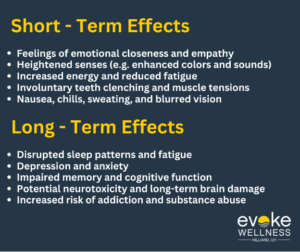You’ve probably heard about the illicit drug ecstasy. Also known as MDMA, this psychoactive substance gained popularity as a party drug in the 1980s and 1990s for its energizing and euphoric effects. But what do you really know about ecstasy? This article provides key facts you need to understand about this dangerous substance:
- Prevalence and legality: Ecstasy use has risen sharply in recent years, with over 18 million people trying it in 2018 alone. It’s classified as a Schedule I illegal drug with no accepted medical use.
- Effects and risks: Ecstasy floods the brain with serotonin and dopamine, causing heightened energy and emotional warmth along with dangerous side effects like hyperthermia, seizures, and cardiac issues.
- Addiction and treatment: Frequent ecstasy use can lead to dependence. Behavioral therapies are often used to help people addicted to ecstasy stop using the drug.
Equipped with this overview, continue reading to learn more about ecstasy and how to protect yourself and loved ones. The potential consequences of experimenting with this hazardous substance are simply too dire to ignore. Call us at (833) 949-1347 today or reach out online.
What Is Ecstasy?
Party Drug Origins
“Molly” or ecstasy refers to the synthetic drug MDMA (3,4-methylenedioxymethamphetamine). It acts as both a stimulant and hallucinogen by increasing serotonin, dopamine and norepinephrine levels in the brain. This creates feelings of euphoria, emotional closeness and heightened energy.
Initially patented as a pharmaceutical compound in the early 1900s, MDMA later became popular with psychotherapists in the 1970s. They used it to enhance counseling by increasing patients’ empathy and openness. However, MDMA soon infiltrated underground rave and club scenes as the party drug “ecstasy.”
Risky High
While users report feeling blissful, loving and energized on ecstasy, the surge of serotonin can have severe side effects. These include:
- Nausea and muscle cramping
- Involuntary teeth clenching and blurred vision
- Rapid heart rate, high blood pressure and hyperthermia
Long-term effects from repeated MDMA use can lead to depression, anxiety, sleep issues and memory problems. Overdoses in extreme cases may even prove fatal.
What Are the Effects of Ecstasy?
Ecstasy, scientifically known as MDMA (3,4-methylenedioxymethamphetamine), is a synthetic psychoactive drug that produces feelings of euphoria, increased energy levels, and emotional warmth. However, its use comes with potential risks and adverse effects.

The effects of ecstasy can vary depending on factors such as dosage, purity, and individual physiology. It’s crucial to be aware of the risks and seek professional help if struggling with addiction or experiencing adverse effects from drug use.
How Does Ecstasy Affect the Brain?
Serotonin Depletion
Ecstasy works by causing a massive release of serotonin, the brain’s “feel-good” neurotransmitter. This leads to feelings of euphoria, emotional warmth and empathy. However, it also causes serotonin depletion, leaving the brain temporarily depleted.
Long-Term Effects
Chronic MDMA use can cause long-lasting brain deficits in areas involving memory, problem-solving and emotion. Studies show some heavy users experience confusion, depression, sleep issues and anxiety even after quitting.
Neurotoxicity Concerns
There are concerns that MDMA may be neurotoxic, damaging serotonin neurons that play a key role in regulating mood, sleep, pain, appetite and other behaviors. The extent of potential permanent brain damage from ecstasy is still being researched.
Is Ecstasy Addictive?
Psychological Addiction Risk
While MDMA or ecstasy is not considered physically addictive, it does carry a high risk of psychological dependence. Frequent use builds tolerance, requiring higher doses to achieve the desired effects and increasing the likelihood of addiction over time. Users may experience withdrawal symptoms like depression, fatigue, and intense cravings when trying to quit.
Signs of Ecstasy Abuse
Some telltale signs of ecstasy addiction include taking more or higher amounts than intended, inability to cut down usage despite wanting to, and spending excessive time or money obtaining the drug despite negative consequences on relationships, work, or health.
Brain Impacts & Side Effects
Ecstasy is neurotoxic and can cause long-term brain damage, impacting memory, decision-making, and increasing risks of mental health issues like depression. Short-term side effects include nausea, blurred vision, and in severe cases, hyperthermia or liver/kidney failure.
Treatment for Recovery
Overcoming ecstasy addiction requires comprehensive treatment programs involving medical detox, therapy, and rehabilitation. Treatment addresses underlying causes while teaching critical life skills for sustained recovery. Options include residential treatment, intensive outpatient programs, and support groups.
Can You Safely Use Ecstasy?
The Dangers of MDMA
Ecstasy, also known as MDMA or “Molly,” is an illegal synthetic drug that produces euphoric and energizing effects. However, its use carries serious risks that should not be overlooked. MDMA can increase heart rate, blood pressure, and body temperature to dangerous levels. It can also lead to dehydration, muscle cramps, nausea, blurred vision, and faintness.
Long-Term Effects
Beyond the immediate risks, long-term MDMA abuse can cause lasting damage to areas of the brain critical for thought, memory, and emotion. Chronic users may experience confusion, depression, sleep problems, anxiety, and impaired memory even after quitting the drug.
No Safe Dose
There is no “safe” dose of MDMA. The purity and composition varies widely among street samples, making it impossible to predict the effects. Many MDMA-related deaths have involved dehydration, hyperthermia, and liver, kidney, and cardiovascular system failure. In summary, any recreational use of MDMA carries unacceptable health risks.
Is There Treatment for Ecstasy Addiction?
Evidence-Based Therapies
Yes, there are effective treatment options available for overcoming ecstasy (MDMA) addiction. Evoke Wellness offers comprehensive rehab programs utilizing evidence-based therapies like cognitive-behavioral therapy (CBT), dialectical behavior therapy (DBT), and acceptance and commitment therapy (ACT) to address the root causes behind substance abuse.
CBT helps identify and change negative thought patterns and behaviors related to ecstasy use. DBT focuses on developing coping mechanisms and emotional regulation skills. ACT promotes psychological flexibility to make values-based choices rather than being controlled by cravings.
Medication-Assisted Treatment
Medication-assisted treatment can also play a vital role by minimizing withdrawal symptoms and cravings during recovery. Medications like Vivitrol, Suboxone, and Methadone are sometimes prescribed to stabilize brain chemistry and prevent relapse.
Comprehensive Care
A well-rounded ecstasy rehab program provides medical detox, therapy, counseling, nutritional support, and aftercare planning. This holistic approach addresses addiction’s physical, psychological, social, and spiritual aspects for lasting sobriety.
Personalized Treatment Plans
Treatment is highly personalized based on the individual’s unique circumstances. Programs like polysubstance rehab are available for those struggling with addiction to multiple substances, including ecstasy. With professional help and commitment, overcoming ecstasy addiction is possible.
Ecstasy FAQs
Common Side Effects
- Dehydration, overheating, muscle pains
- Irrational behavior, hallucinations, anxiety
- Lack of appetite, vomiting, neurological damage
Risk of Addiction
While not physically addictive like opioids, frequent ecstasy use can lead to psychological dependence. Users may increase doses to maintain the high, increasing addiction risk. Signs include inability to cut down despite wanting to and continuing use despite negative consequences.
Treatment Options
Seeking comprehensive, personalized treatment is crucial to heal from side effects and prevent permanent damage. Options include detox programs, residential/outpatient rehab, therapy (CBT, motivational interviewing), and treating co-occurring mental health issues.
Conclusion
You now have a better understanding of the illicit drug ecstasy – its effects, dangers, and prevalence in society today. While experimentation is common during youth, the risks are real. Seek support if use becomes habitual. Treatment and counseling can restore health and relationships damaged by addiction. Your future is bright when you make informed choices. The door is always open when you are ready to walk through it.
Begin Your Journey with Evoke Wellness at Hilliard
If you or a loved one is considering treatment, Evoke Wellness at Hilliard invites you to contact us. Our compassionate team is ready to answer your questions, discuss your needs, and help you take the first steps toward recovery. In Hilliard, you’ll find more than just a treatment program – you’ll discover a community dedicated to your wellness and success. Together, let’s embrace the journey to recovery and the promise of a new beginning. Call us at (833) 949-1347 today or reach out online.



